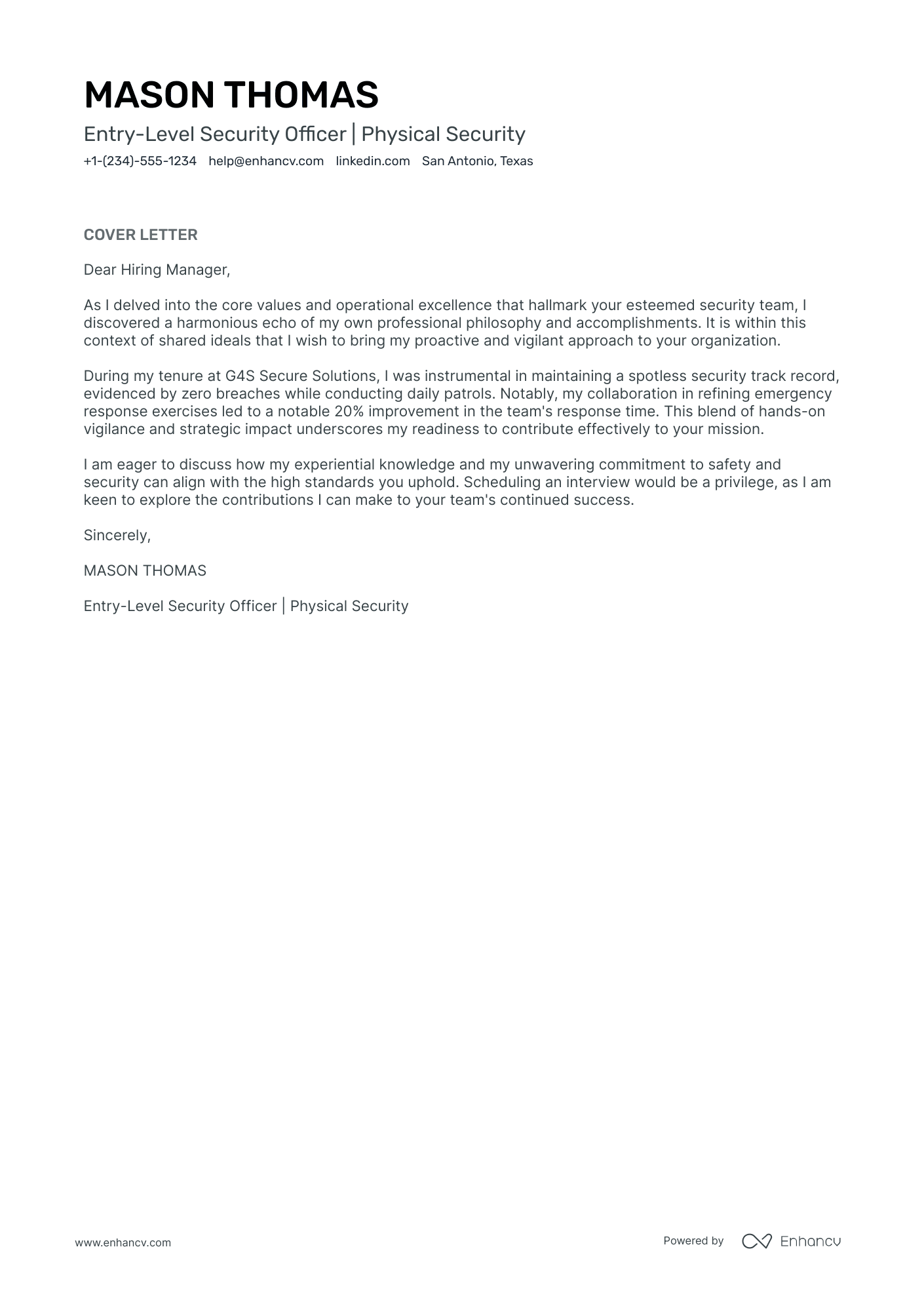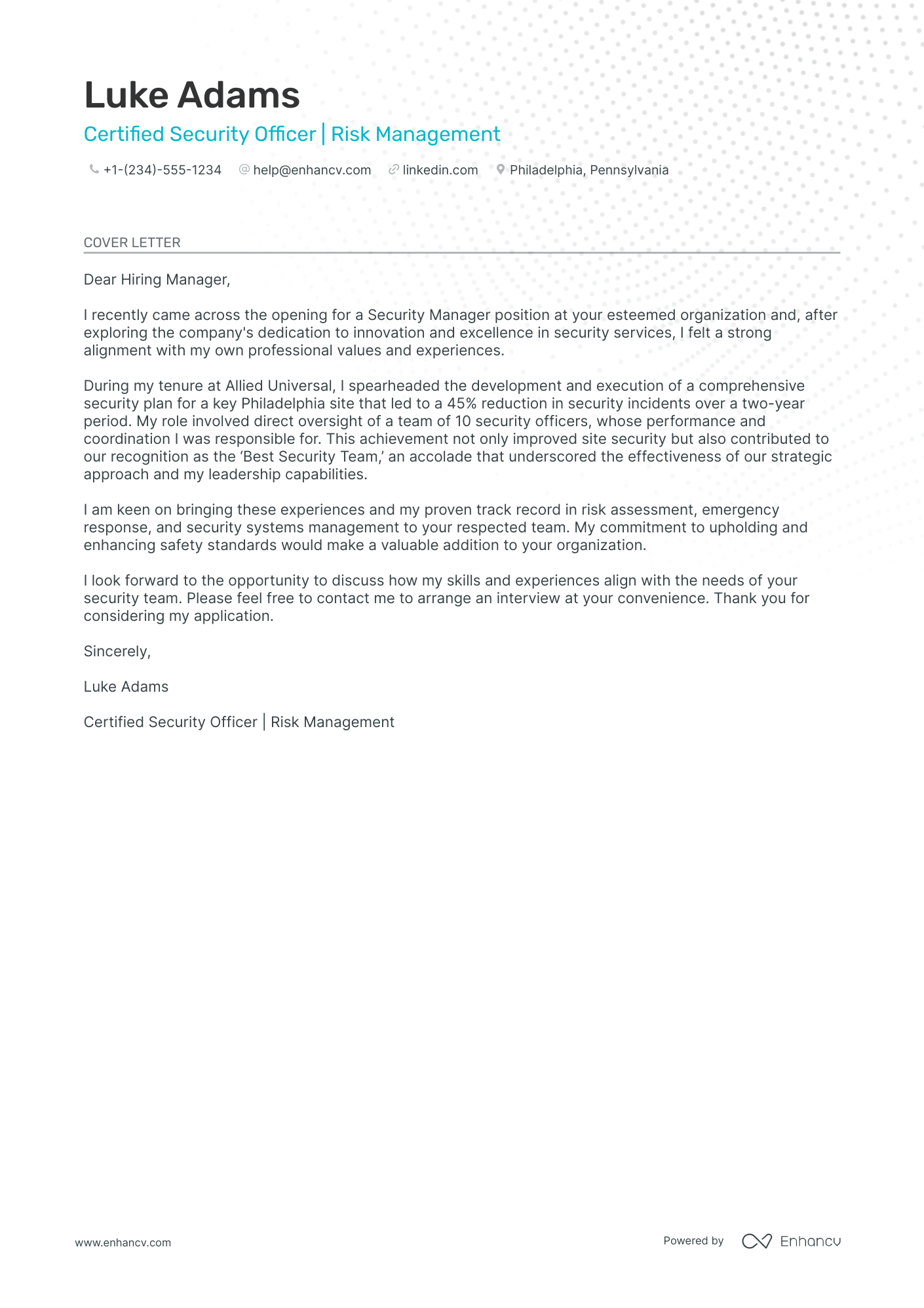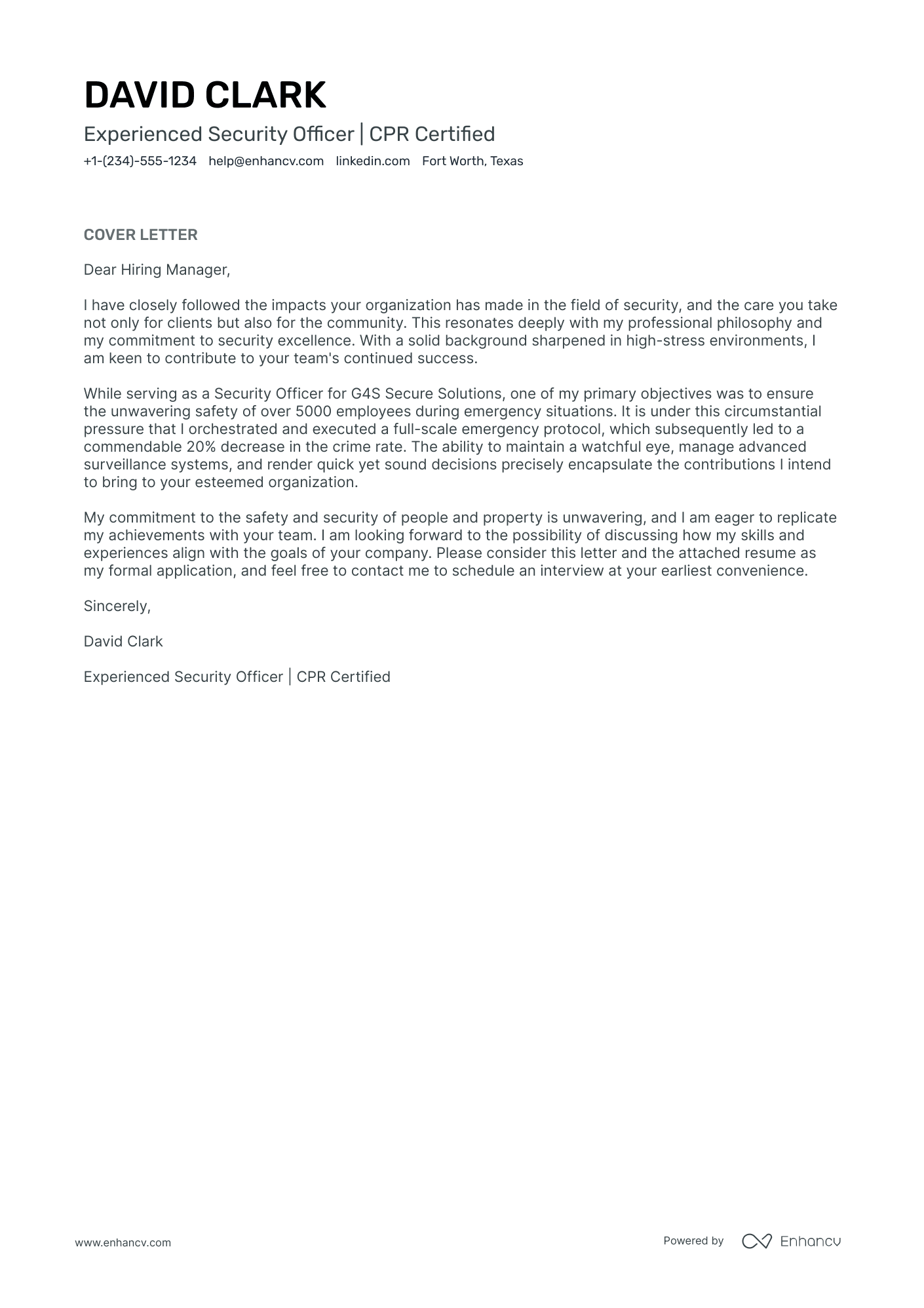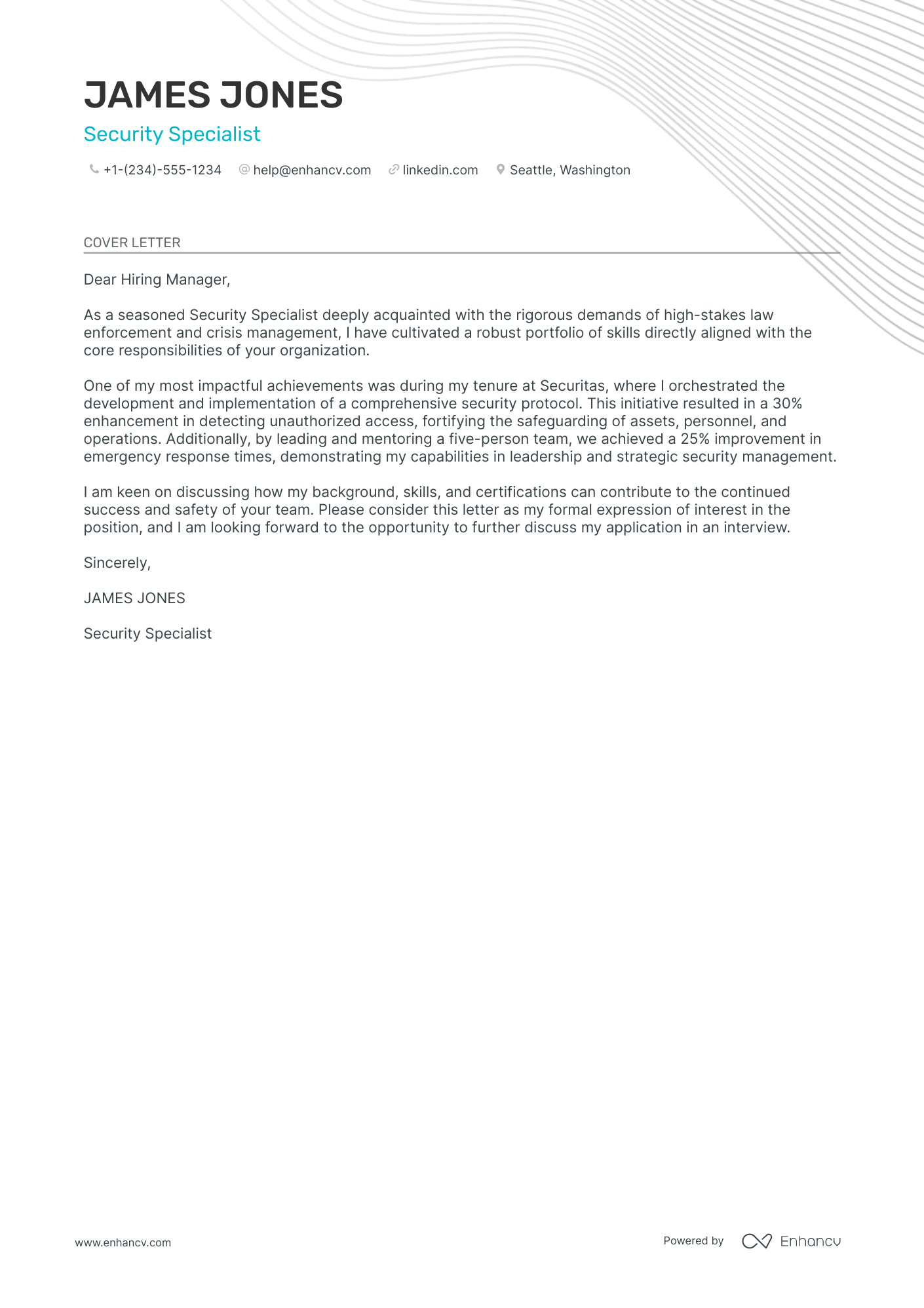Writing a security officer cover letter can be a daunting task. You've found the perfect job and realized a compelling cover letter is required, not just your resume. It's crucial to narrate your proudest professional achievement without repeating your CV. Striking a balance between formality and originality, while dodging clichés, makes for a powerful introduction. Remember, brevity is key—keep it to one page to make a strong, succinct impression. Let's dive in and craft a cover letter that stands out.
- Making excellent use of job-winning real-life professional cover letters;
- Writing the first paragraphs of your security officer cover letter to get attention and connect with the recruiters - immediately;
- Single out your most noteworthy achievement (even if it's outside your career);
- Get a better understanding of what you must include in your security officer cover letter to land the job.
Let the power of Enhancv's AI work for you: create your security officer cover letter by uploading your resume.
If the security officer isn't exactly the one you're looking for we have a plethora of cover letter examples for jobs like this one:
- Security Officer resume guide and example
- Public Safety Officer cover letter example
- Volunteer Firefighter cover letter example
- Investigator cover letter example
- Emergency Dispatcher cover letter example
- Firefighter cover letter example
- Incident Manager cover letter example
- 911 Dispatcher cover letter example
Drop your resume here or choose a file.
PDF & DOCX only. Max 2MB file size.
Security officer cover letter example
John Walker
Fort Worth, Texas
+1-(234)-555-1234
help@enhancv.com
- Emphasizing practical achievements, such as the development and execution of security plans and the implementation of a new alarm response system, demonstrates the applicant's direct impact on operational improvements within security management.
- Mentioning a collaboration with federal agencies in refining threat assessment protocols showcases the candidate's ability to work with government bodies and manage insider threat scenarios, which is crucial for high-level security operations positions.
- Highlighting a quantifiable outcome, such as achieving a 40% reduction in false alarm rates, provides concrete proof of the candidate's effectiveness in their role and suggests a data-driven approach to security operations.
Designing your security officer cover letter: what is the best format
Let's start with the basics, your security officer cover letter should include your:
- Header
- Greeting
- Introduction
- Body paragraph
- Closing statement
- Signature (that's not a must)
Next, we'll move to the spacing of your security officer cover letter, and yes, it should be single-spaced (automatically formatted for you in our cover letter templates).
Don't go for a old-school font (e.g. Arial or Times New Roman), but instead, pick an ATS-favorite like Chivo, Volkhov, or Raleway, to stand out.
Our cover letter builder is also set up for you with the standard one-inch margin, all around the text.
Finally, ensure your security officer resume and cover letter are in the same font and are submitted in PDF (to keep the formatting in place).
P.S. The Applicant Tracker System (or ATS) won't be assessing your [job] cover letter, it's solely for the recruiters' eyes.
Pressed for time? Use our free cover letter generator to turn your resume into a cover letter effortlessly.
The top sections on a security officer cover letter
- Header: Include your contact information and the date to ensure the recruiter knows who you are and how to reach you, which is critical in a profession where reliability and attention to detail are paramount.
- Greeting: Use a professional salutation, addressing the hiring manager by name if possible, as it demonstrates your investigation and interpersonal skills, both of which are important in security-related positions.
- Introduction: Briefly introduce yourself and express your enthusiasm for the security officer role; this sets the tone and shows your commitment to the safety and security profession.
- Body: Highlight relevant experience, such as specific security tasks you've performed or emergency situations you've handled, to showcase your competence and readiness for the responsibilities of a security officer.
- Closing: End with a strong conclusion, reiterating your interest in the role and mentioning your availability for an interview, while emphasizing your commitment to maintaining a secure environment, indicative of a dedicated security professional.
Key qualities recruiters search for in a candidate’s cover letter
- Proven experience in surveillance systems and emergency response protocols: critical for preventing and responding to incidents effectively.
- Strong observational skills: essential for identifying suspicious behavior and preventing potential security breaches.
- Physical fitness and stamina: necessary for patrolling premises, responding to incidents swiftly, and potentially diffusing physical altercations.
- Excellent communication and reporting skills: important for writing detailed incident reports and communicating with law enforcement and emergency personnel.
- Knowledge of relevant laws and regulations: ensures compliance with legal standards and helps in handling situations according to the law.
- Ability to work independently and as part of a team: required for coordinating effectively with other security personnel and staff members to maintain a secure environment.
How to start your security officer cover letter: with a greeting, of course
Have you ever considered just how powerful a personalized salutation can be?
We sure have news for you! Your security officer cover letter should start with the right salutation to recruiters, nurturing a sense of respect and individuality.
Greet recruiters by using their first name (e.g. "Dear Tom" or "Dear Patricia") if you've previously established contact with them.
Otherwise, opt out for the less familiar, "Dear Ms. Peaches" or "Dear Ms Kelsey", if you've found the recruiter's name on LinkedIn or a corporate website.
"To whom it may concern" is never a good option, as it creates a sense that you've been sending out your security officer cover letter to anyone. Instead, use "Dear HR team" or "Dear (company name) recruiter" for a feeling of exclusivity.
List of salutations you can use
- Dear Hiring Manager,
- Dear [Company Name] Team,
- Dear [Mr./Ms./Dr.] [Last Name],
- Dear Search Committee,
- Dear Human Resources Director,
- Dear [Job Title] Hiring Team,
The security officer cover letter introduction: focusing on your unique value, with a creative twist
You are not the only one wondering how to start your security officer cover letter. Those first two sentences introduce your profile and should be memorable.
No pressure.
When beginning your security officer cover letter, immediately point out the unique value of working with you. In other words, what you promise to bring to the role by using your past track record of success.
Start your security officer cover letter with a creative twist by telling a joke or stating something relatable. Select this type of introduction only if it aligns with the company culture.
What comes next: your security officer cover letter middle paragraphs
In the next three to six paragraphs (or the body of your security officer cover letter) you have to prove your unique value.
Most candidates tend to mess up at this stage. They tend to just copy-paste information from their resume.
That's one big no-no.
Remember that when writing your security officer cover letter, it has to be personalized. And, your ultimate aim is to catch the recruiter's eye.
So, look back on key job requirements and write down a list that includes the ones you cover.
Next, select just one key achievement from your professional (or personal) history that meets those advert keywords.
Narrate a story around how you've grown your skill set and knowledge. Also, aim to show the unique understanding or soft skills you bring about, thanks to your past success.
Closing paragraph basics: choose between a promise and a call to action
You've done all the hard work - congratulations! You've almost reached the end of your security officer cover letter.
But how do you ensure recruiters, who have read your application this far, remember you?
Most security officer professionals end their cover letter with a promise - hinting at their potential and what they plan on achieving if they're hired.
Another option would be to include a call for follow-up, where you remind recruiters that you're very interested in the opportunity (and look forward to hearing from them, soon).
Choose to close your security officer cover letter in the way that best fits your personality.
No experience security officer cover letter: making the most out of your profile
Candidates who happen to have no professional experience use their security officer cover letter to stand out.
Instead of focusing on a professional achievement, aim to quantify all the relevant, transferrable skills from your life experience.
Once again, the best practice to do so would be to select an accomplishment - from your whole career history.
Another option would be to plan out your career goals and objectives: how do you see yourself growing, as a professional, in the next five years, thanks to this opportunity?
Be precise and concise about your dreams, and align them with the company vision.
Key takeaways
Winning at your job application game starts with a clear and concise security officer cover letter that:
- Has single-spaced paragraphs, is wrapped in a one-inch margin, and uses the same font as the security officer resume;
- Is personalized to the recruiter (using their name in the greeting) and the role (focusing on your one key achievement that answers job requirements);
- Includes an introduction that helps you stand out and show what value you'd bring to the company;
- Substitutes your lack of experience with an outside-of-work success, that has taught you valuable skills;
- Ends with a call for follow-up or hints at how you'd improve the organization, team, or role.
Security Officer cover letter examples
By Experience
Entry-Level Security Officer
By Role












